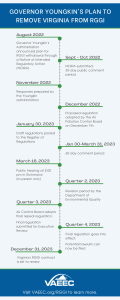The Latest
During the first two years of participation, RGGI provided $250M to make low-income housing in Virginia more energy efficient. The Housing Innovation Energy Efficiency (HIEE) fund, administered by the Department of Housing and Community Development, provides capital to make energy efficiency upgrades to both new and existing housing. These funds allow weatherization providers and affordable housing developers to provide safe, affordable, and energy-efficient homes to low-income families like never before.
A report released by the Virginia Commonwealth University, Investing in Virginia Through Energy Efficiency: An Analysis of the Impacts of RGGI and the HIEE Program, modeled the impacts of the energy efficiency revenue that would be generated if the Commonwealth remains in RGGI through 2030. It is predicted that the revenue generated would fund energy efficiency improvements to over 100,000 low-income homes, resulting in approximately $70-80M in customer savings per year. This breaks down to an average annual savings of $676 per household.
Regulatory Action
On December 7, 2022, the Air Pollution Control Board voted in support of the proposed regulations to withdraw Virginia from RGGI. The draft regulation was posted on January 30, 2023, kicking off the 60-day public comment period. You can see VAEEC’s comments to the Air Board on our main RGGI page under Resources.
In a letter to the Air Board, Virginia legislators state that this regulatory action is unlawful and that only the General Assembly has the authority to end the state’s participation in this vital program. However, on December 7, 2022, a representative for the Office of the Attorney General (OAG) stated the Air Board does have authority, despite a previous opinion that was shared with Air Board members allegedly stating that the board did not have authority to do so.
On June 7, 2023, the Air Board voted to adopt the final regulation to withdraw Virginia from RGGI. On July 31st, the regulation was posted in the Virginia Register, which was the final regulatory action and the point at which lawsuits could be filed.
A lawsuit was initially filed with the Fairfax County courts. The judge ruled that the only organization with legal standing to file a suit was the Association of Energy Conservation Professionals, headquartered in Floyd, Virginia. Therefore, the case was moved to the Floyd County courts. VAEEC filed a joint amicus brief with the Virginia Clinicians for Climate Action through the University of Virginia Law Clinic. On February 5, 2024, the Circuit Court of Floyd County decided that the case challenging the state’s decision to leave RGGI will proceed. This includes the claims that “the Air Pollution Control Board, DEQ, and its director do not have the authority to remove the state from RGGI, and that the administration didn’t support the decision with the evidence required by the Virginia Administrative Process Act”.
Soon after, Floyd County Circuit Judge Mike Fleenor recused himself citing a conflict of interest. The new judge assigned to the case, Judge Randall Lowe, granted the state’s request to vacate Fleenor’s denial of its motion and consider the request to dismiss anew. Lowe ruled on June 24th that AECP does have standing in this lawsuit. Therefore, the lawsuit is moving forward.
Stay tuned here for updates.
Legislative Action
A RGGI repeal bill, SB 1001, was introduced during the 2023 General Assembly Session by Senator Stuart but has been passed by indefinitely.
A provision in the Governor’s 2023 budget bill (SB800) withdraw $18M from the RGGI energy efficiency fund for flooding relief in Southwest Virginia, which the Coastal Resiliency Fund should already support.

